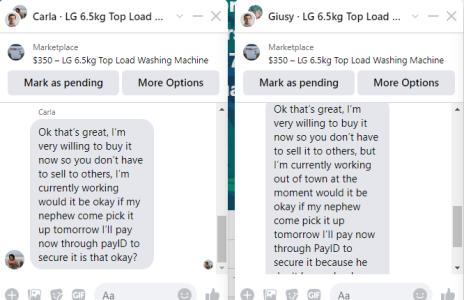Scam Alert: Sneaky scammers on Facebook Marketplace are stealing money using PayID
Facebook Marketplace is a convenient platform for unloading items you no longer need or want. However, it has also become a hotbed for scams, with many unscrupulous users looking to swindle money from unsuspecting sellers. These don’t always involve unrealistic offers, which is why it’s important to be vigilant when dealing with strangers online.
One Redditor noticed they were receiving similar messages from potential buyers on the platform. The users wanted to pay through PayID and said they couldn’t meet up, but a ‘nephew’ would pick up the item. The Redditor quickly realised these were scams.
The post prompted other Redditors to share their own experiences.
A top comment said: ‘I’m currently selling heaps on FB [Facebook] because I’m moving. I’ve found putting ‘cash only’ in the description does help to reduce the number of people sending these messages. They’re quite easy to detect in how they talk.’
Another commented: ‘I get these a lot on FB Marketplace. One thing they love doing is spending a lot of time asking questions. You got to cut them off in the beginning and ask, “Are you going to pay in cash?” They usually don't respond after that.’
A third chimed in: ‘My MIL got scammed using this on FB Marketplace and almost again through Gumtree.’
Many were unfamiliar with the scam and wanted to know how it worked. A comment said: ‘For those wondering how it plays out – they ask for your phone number or email and then send you a text or email containing something along the lines of your PayID is not working for X reason, to receive the money, press here to fix. Essentially, it is a phishing exercise. You never receive the money.’
PayID, which has been around since 2018, is an instant payment infrastructure that promises fast and secure transactions. You can sign up with a mobile number, email address, ABN, or Organisation Identifier, and then you’re set to receive payments directly to your bank account.
Meanwhile, phishing refers to the deceitful practice of pretending to be from a legitimate business and sending urgent messages to users to gain their personal information. It can be done through email, text messages, and phone calls. You can find more information about phishing on Scamwatch.
There are variations on this scam but the suspicious interactions share a few key elements:
A Redditor warned others using the service: ‘PayID will never email you when purchasing, just like Visa or Mastercard. Instead, it should be the bank or finance company.’
PayID also issued a warning on its website: ’PayIDs are managed by your bank, and PayID would never contact you directly. If you have concerns, please contact your bank.’
Many urged checking Facebook profiles before transacting with a buyer. A user said: ‘Always check their Facebook profile. They are using hacked or fake Facebook profiles. Check their location and recent posts to ensure they are not scammers.’
However, the original poster claimed they had done their due diligence: ‘Yep, I looked up “Carla” and others... they are all legit profiles of real people being misused by scammers, just with their profile pictures.’
Others shared how they noticed dead giveaways that they were interacting with fraudsters. A Redditor wrote: ‘The biggest red flag for me when I got this was how few people are close enough with their nephews to have them do odd jobs for them.’
Another said: ‘Working out of town’ – definitely not Australian speak.’
Someone else commented: ‘I got one of these recently. Their message said they would pay “with Cashapp or Velle” then just followed it up with ‘I mean PayID’.’
A fourth shared: ‘I received the exact same message from “Carla” a few days ago. I’ve never sold stuff online before, and her message seemed very off!’
Australian Payments Plus, the organisation behind PayID, insists that PayID ‘remains a safe way for customers to receive money’. Speaking with SBS, a spokesperson acknowledged the rising cases of fraudulent behaviour and urged customers to be more vigilant of potential scams.
‘Protecting customers against scams requires a collective effort, and Australian Payments Plus continues to work closely with the banks, the broader financial services industry, and regulators to combat this issue. In this case, Australian Payments Plus is also taking specific action to get fraudulent email addresses claiming to be from PayID closed,’ the spokesperson added.
If you have been tricked into sending money through this scam, you can report it to Scamwatch here. ACCC also recommends contacting your financial institution and the selling platform involved and informing friends and family for support.
Have you encountered any suspicious messages from buyers on Facebook Marketplace? Share your experience with us in the comments section below.
One Redditor noticed they were receiving similar messages from potential buyers on the platform. The users wanted to pay through PayID and said they couldn’t meet up, but a ‘nephew’ would pick up the item. The Redditor quickly realised these were scams.
The post prompted other Redditors to share their own experiences.
A top comment said: ‘I’m currently selling heaps on FB [Facebook] because I’m moving. I’ve found putting ‘cash only’ in the description does help to reduce the number of people sending these messages. They’re quite easy to detect in how they talk.’
Another commented: ‘I get these a lot on FB Marketplace. One thing they love doing is spending a lot of time asking questions. You got to cut them off in the beginning and ask, “Are you going to pay in cash?” They usually don't respond after that.’
A third chimed in: ‘My MIL got scammed using this on FB Marketplace and almost again through Gumtree.’
Many were unfamiliar with the scam and wanted to know how it worked. A comment said: ‘For those wondering how it plays out – they ask for your phone number or email and then send you a text or email containing something along the lines of your PayID is not working for X reason, to receive the money, press here to fix. Essentially, it is a phishing exercise. You never receive the money.’
PayID, which has been around since 2018, is an instant payment infrastructure that promises fast and secure transactions. You can sign up with a mobile number, email address, ABN, or Organisation Identifier, and then you’re set to receive payments directly to your bank account.
Meanwhile, phishing refers to the deceitful practice of pretending to be from a legitimate business and sending urgent messages to users to gain their personal information. It can be done through email, text messages, and phone calls. You can find more information about phishing on Scamwatch.
There are variations on this scam but the suspicious interactions share a few key elements:
- The buyer will insist on using PayID.
- The buyer will have an excuse not to meet but say that someone close or related to them will retrieve the item.
- The buyer will say that they have a PayID business account – this is currently not offered by the platform.
A Redditor warned others using the service: ‘PayID will never email you when purchasing, just like Visa or Mastercard. Instead, it should be the bank or finance company.’
PayID also issued a warning on its website: ’PayIDs are managed by your bank, and PayID would never contact you directly. If you have concerns, please contact your bank.’
Many urged checking Facebook profiles before transacting with a buyer. A user said: ‘Always check their Facebook profile. They are using hacked or fake Facebook profiles. Check their location and recent posts to ensure they are not scammers.’
However, the original poster claimed they had done their due diligence: ‘Yep, I looked up “Carla” and others... they are all legit profiles of real people being misused by scammers, just with their profile pictures.’
Others shared how they noticed dead giveaways that they were interacting with fraudsters. A Redditor wrote: ‘The biggest red flag for me when I got this was how few people are close enough with their nephews to have them do odd jobs for them.’
Another said: ‘Working out of town’ – definitely not Australian speak.’
Someone else commented: ‘I got one of these recently. Their message said they would pay “with Cashapp or Velle” then just followed it up with ‘I mean PayID’.’
A fourth shared: ‘I received the exact same message from “Carla” a few days ago. I’ve never sold stuff online before, and her message seemed very off!’
Australian Payments Plus, the organisation behind PayID, insists that PayID ‘remains a safe way for customers to receive money’. Speaking with SBS, a spokesperson acknowledged the rising cases of fraudulent behaviour and urged customers to be more vigilant of potential scams.
‘Protecting customers against scams requires a collective effort, and Australian Payments Plus continues to work closely with the banks, the broader financial services industry, and regulators to combat this issue. In this case, Australian Payments Plus is also taking specific action to get fraudulent email addresses claiming to be from PayID closed,’ the spokesperson added.
If you have been tricked into sending money through this scam, you can report it to Scamwatch here. ACCC also recommends contacting your financial institution and the selling platform involved and informing friends and family for support.
Have you encountered any suspicious messages from buyers on Facebook Marketplace? Share your experience with us in the comments section below.








